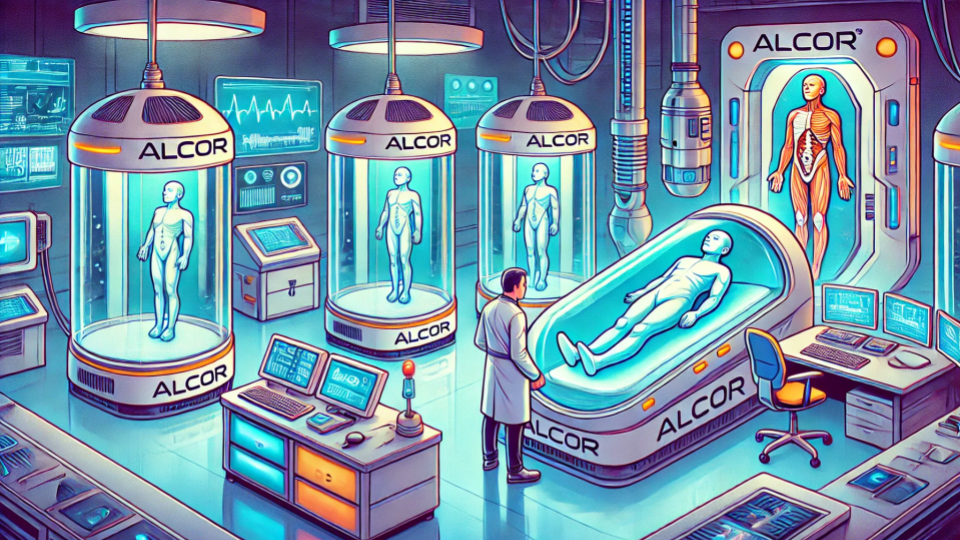Alcor : Preserving Bodies For Future Revival – Science or Science Fiction?

Alcor Life Extension Foundation, commonly known as Alcor, is a nonprofit organization specializing in cryonics—the practice of preserving human bodies at extremely low temperatures with the hope of future revival. Founded in 1972 by Fred and Linda Chamberlain in California, Alcor has been at the forefront of cryonics research and services for over five decades. (Alcor)
Alcor offers cryopreservation services to individuals who choose to have their bodies or brains preserved after legal death. The goal is to maintain the body’s condition until medical advancements can potentially restore life and health. This process involves cooling the body to subfreezing temperatures to halt biological decay. Originally established in California, Alcor moved its headquarters to Scottsdale, Arizona, in 1994. This location houses their state-of-the-art facility where they perform cryopreservations and store patients. (Wikipedia)
Fred and Linda Chamberlain, both with backgrounds in engineering and science, founded Alcor to explore and advance cryonics. Their vision was to create an organization dedicated to extending human life through technological means. Alcor’s work sits at the intersection of science and futurism. By pushing the boundaries of what’s possible in life preservation, they aim to offer individuals a chance at life extension that current medical science cannot provide. Their efforts contribute to ongoing discussions about the future of medicine and human longevity.
The Cold Start: How Alcor Came to Life
Fred and Linda Chamberlain met in 1970 through their shared interest in cryonics. Both were part of a committee organizing the Third National Conference on Cryonics, sponsored by the Cryonics Society of California (CSC). Fred, an engineer at the Jet Propulsion Laboratory (JPL) in Pasadena, California, worked on space missions like Voyager. Linda had a background in science and shared Fred’s passion for life extension technologies. (Fred and Linda Chamberlain)
Early Challenges and New Beginnings
The Chamberlains faced challenges within CSC, including resistance to rapid technological advancements and a lack of transparency in decision-making. These issues led them to withdraw from CSC by the summer of 1971. Determined to pursue their vision, they founded Alcor Life Extension Foundation in early 1972.
Establishing Alcor
Named after a star in the Big Dipper, Alcor was established to advance cryonics research and provide cryopreservation services. The Chamberlains also founded Manrise Corporation to support cryonics research and development. Through Manrise, they assisted in founding Trans Time, Inc., a cryonics service provider in the San Francisco Bay Area.
In 1976, Alcor performed its first human cryopreservation on Fred’s father, Frederick Rockwell Chamberlain Jr., marking a significant milestone in cryonics history. This event demonstrated Alcor’s commitment to advancing cryonics technology and services. Fred and Linda Chamberlain’s dedication laid the foundation for Alcor’s growth into a leading cryonics organization. Their work has inspired ongoing research and discussions about life extension and cryonics.
An Icy Industry: Freezing for the Future
Cryonics involves preserving individuals at extremely low temperatures after legal death, aiming for future revival when medical advancements allow. This concept, though niche, has garnered attention over the years. The global cryonics technology market was valued at approximately USD 4.89 million in 2023. Projections indicate it could reach USD 12.35 million by 2029, reflecting a Compound Annual Growth Rate (CAGR) of 16.71% during this period. (Stats Market Research)
Factors Driving Growth
Several elements contribute to this market’s expansion:
- Advancements in Medical Science: Progress in nanotechnology and regenerative medicine fuels interest in cryonics.
- Rising Interest in Life Extension: An increasing number of individuals seek methods to extend life, boosting demand for cryonics services.
- Technological Innovations: Developments in cryopreservation techniques enhance the feasibility and appeal of cryonics.
Challenges in the Market
Despite growth, the cryonics market faces obstacles:
- Ethical and Legal Concerns: Debates about the morality and legality of cryonics persist, affecting public acceptance.
- High Costs: Cryopreservation services are expensive, limiting accessibility for many.
- Scientific Uncertainty: The lack of guaranteed revival success raises skepticism among potential clients.
Regional Insights
North America leads the cryonics market, with organizations like Alcor Life Extension Foundation and Cryonics Institute based in the U.S. Europe and Asia-Pacific regions are witnessing growing interest, though they lag behind North America in terms of infrastructure and service providers.
The cryonics market is poised for significant growth, driven by technological advancements and increasing interest in life extension. However, addressing ethical concerns, reducing costs, and achieving scientific breakthroughs are crucial for its broader acceptance and expansion.
Frozen Ambitions: Alcor’s Vision for the Ages
Mission
Alcor’s mission is to save lives through cryonics. They aim to preserve individuals at low temperatures after legal death. The goal is to restore them to health when future medical technologies allow. Alcor also funds research to develop more effective preservation methods. They provide public education to support their objectives. (Alcor Mission)
Vision
Alcor envisions a future where death is a reversible process. They strive to advance cryonics to make this possible. Their vision includes integrating preserved individuals back into society. Alcor focuses on innovation and research to achieve this. (About Alcor)
Problems They Solve
Alcor addresses the challenge of irreversible death. They offer cryopreservation as a means to halt biological decay. This provides individuals a chance at future revival. Alcor also tackles the issue of limited medical solutions for terminal conditions. By preserving patients, they keep the possibility of future cures open. Additionally, Alcor contributes to scientific research in cryobiology. This aids in developing better preservation techniques.
Business Model
Alcor operates as a nonprofit organization. They offer membership plans for individuals seeking cryopreservation. Members pay annual dues and arrange funding for preservation. This is often through life insurance policies. Alcor provides two main services: whole-body preservation and neuro-preservation. Whole-body preservation involves cooling and storing the entire body. Neuro-preservation focuses on preserving the brain. Alcor also invests in research to improve cryonics technology. They engage in public education to raise awareness about cryonics.
All Wrapped Up: Alcor’s Services for Life Extension
Alcor Life Extension Foundation offers membership to individuals interested in cryonics, providing them with unique benefits and services that ensure preparedness for cryopreservation at the time of legal death. Alcor’s membership includes a comprehensive standby service, cryopreservation options, and long-term care, all designed with the goal of possible future revival and societal reintegration. (Membership)
Membership Benefits
- Standby and Deployment: Alcor’s Deployment and Response Team (DART), established in 2023, comprises former military personnel, nurses, and first responders. DART members undergo rigorous training, including bi-annual refresher courses, to ensure they’re equipped for immediate deployment when members need assistance. This team’s readiness ensures rapid response for initiating cryopreservation.
- Cryopreservation Options: Members can choose between whole-body cryopreservation and neuro cryopreservation (brain-only preservation). Both options involve precise techniques conducted at Alcor’s advanced facilities, utilizing cryoprotectants to minimize tissue damage during freezing.
- Long-Term Care: Patients are stored in cryogenic dewars at a stable temperature of -196°C. Alcor’s secure facilities, chosen for their minimal disaster risk and proximity to major transport hubs, ensure the ongoing safety of patients in biostasis.
Costs and Funding
- Membership Dues: Alcor’s dues vary based on the applicant’s age at the time of enrollment, with options to add family members. Child family members incur an additional $60 annual fee.
- Cryopreservation Funding: Funding for cryopreservation is generally arranged through life insurance, with most members naming Alcor as the beneficiary of policies designed to cover these costs. Alcor requires a minimum insurance coverage of $220,000 for whole-body cryopreservation and $80,000 for neuro cryopreservation. To account for inflation and future cost increases, members are advised to select policies that allow for an increased benefit amount over time.
- Patient Care Trust: Upon a member’s cryopreservation, a portion of the funding is allocated to the Alcor Patient Care Trust, covering long-term storage expenses. Specifically, $115,000 from whole-body cryopreservation and $25,000 from neuro cryopreservation are allocated to the Trust, which transfers assets to the Alcor Care Trust Supporting Organization for liability protection. Investments managed by Morgan Stanley generate income that sustains storage costs indefinitely, providing members and their families with peace of mind.
Advanced Technical Support
Alcor’s membership infrastructure integrates advanced technical support to maintain high standards in cryonics:
- The DART team provides continuous standby and emergency services, ensuring readiness to initiate preservation at the earliest possible moment.
- Alcor’s storage facilities, chosen for stability and security, are equipped with cutting-edge technology to monitor and sustain the necessary ultra-low temperatures.
Freeze Frame : Cryopreserving Pets at Alcor
Alcor Life Extension Foundation extends its cryopreservation services to pets, offering owners the chance to preserve their beloved animals alongside their own cryonic arrangements. However, pet cryopreservation is only available to individuals who are active human members of Alcor. (Pets at Alcor)
Options for Pet Cryopreservation
- Perfusion Cryopreservation:
- In this advanced option, the pet is euthanized at Alcor by a qualified veterinarian, who then performs a perfusion procedure. This process involves infusing a cryoprotectant, a medical-grade antifreeze, into the pet’s vascular system to minimize freezing damage. The perfusate cools the pet’s brain and tissue from the inside out, unlike traditional freezing methods that cool from the outside in, which can cause more cellular damage.
- Due to the complexity and need for specialized materials, perfusion is more costly than other methods. Alcor performs this procedure exclusively at their facility in Scottsdale, and it requires prior scheduling. The cost includes both euthanasia and perfusion, but transport expenses to Alcor are separate.
- Straight Freeze Cryopreservation:
- This is the simpler and more common option for pet cryopreservation at Alcor. Upon arrival, the pet undergoes controlled cooling to reach the temperature of liquid nitrogen before placement in long-term storage. The straight freeze does not involve the antifreeze-like cryoprotectant used in perfusion, making it more affordable, but it may not preserve cellular structures as effectively.
- Many types of pets, including species beyond cats and dogs, have been preserved at Alcor using this method.
Considerations and Limitations
- Revival Uncertainty: Alcor emphasizes that while cryopreservation provides a means to preserve pets in a stable state, there are no guarantees regarding future revival, especially within the current owner’s lifetime. The technology for reviving cryopreserved animals is not yet available, and no promises are made about scientific advancements that would allow for successful revival.
- Advanced Preparation: Alcor requires that all pet preservation arrangements be made in advance. Pet cryopreservation is not available on a walk-in basis, and strict packaging and transport guidelines must be followed. Contacting Alcor beforehand is essential to ensure proper preparation and adherence to protocol.
Independent Cryonics Educators Program (ICE)
The Alcor Life Extension Foundation’s Independent Cryonics Educators (ICE) Program invites individuals to promote cryonics education independently. This program is open to approved applicants, who, upon acceptance, can refer potential members to Alcor without the requirement of being Alcor members themselves. Participants are known as “Ambassadors” and enter the program by signing an ICE participant agreement and submitting a W9 form. (ICE Program)
Program Benefits and Payment Structure
- Referral Code: Approved participants receive a unique referral code, which offers potential members a 50% discount on their first-year dues. Additionally, ambassadors earn a referral fee for each new membership obtained through their code.
- Compensation Details: Payments are subject to a waiting period, particularly for dues paid via credit card or other methods that may experience delays, such as charge-backs or check-hold periods. The specific compensation structure and discount codes are outlined in ICE’s official resources, ensuring transparency and clarity for participants.
- Independence and Compliance: ICE participants act independently of Alcor, meaning they are not official agents or representatives. They must comply with all applicable regulatory or legal requirements regarding their educational and referral activities, including paying taxes on any income earned through the program.
- Alcor’s Discretionary Approval: Alcor holds the right to approve or deny program participation at its discretion, and can also revoke approval for any reason, provided any verified and approved outstanding payments are settled.
Through the ICE Program, Alcor aims to expand cryonics awareness and membership outreach, empowering individuals to contribute to the cryonics community with an incentive-based, flexible model.
Frozen in Time: The Cool Science Behind Alcor
Alcor Life Extension Foundation offers two main cryopreservation options: Neuropreservation (Neuro) and Whole-Body Preservation (WB). Each approach has unique advantages, and the choice between them is highly personal, with Alcor members almost evenly split between the two. Alcor provides resources to help individuals make an informed decision but does not recommend one option over the other. (Cryopreservation Options)
Neuropreservation (Neuro)
- Focus on Brain Cryoprotection:
- Neuropreservation focuses solely on preserving the brain. Cryoprotectant perfusion in Neuro patients optimizes brain preservation by independently monitoring venous concentrations in both brain hemispheres, which ensures even distribution of the cryoprotectant. This method allows for better brain tissue preservation compared to Whole-Body perfusion, which averages the cryoprotectant concentration across the body.
- Technical Advantages:
- The cryoprotectant used for Neuro patients is slightly less viscous, allowing faster and more complete perfusion. This also enhances venous drainage due to lower venous pressure, improving the effectiveness of cryoprotectant infusion and minimizing ice formation.
- Cost Efficiency and Transport Flexibility:
- Neuro cryopreservation is less expensive in terms of storage, making it a viable option for those seeking to allocate funds to a long-term trust. Neuro patients can also be transported across state lines without waiting for permits, expediting the preservation process by potentially several days.
- Storage and Memorial Options:
- Neuro preservation enables family members to retain cremated remains, providing an option for memorial services or keepsakes.
- Adaptability in Revival:
- Although severing the spinal cord removes some motor memory and nerve connections, most motor skills are believed to reside within specific brain regions (e.g., cerebellum and motor cortex). Neuroplasticity may help adapt to regenerated nerve connections, and memory-based algorithms could potentially reconstruct familiar nerve patterns.
Whole-Body Preservation (WB)
- Comprehensive Preservation:
- Whole-body cryopreservation retains the entire nervous system, organs, glands, and microbiome, making it a more conservative approach. This choice appeals to those who view their body as integral to their identity and believe that revival may be smoother if they “wake up” in their original body. It preserves all physical aspects that may assist in restoring motor functions, such as walking, athletic skills, or other body-based activities.
- Enhanced Cryoprotection for Whole Body:
- WB preservation uses a cryoprotectant with an additional agent that reduces edema, which is particularly beneficial for ischemic patients as it may help prevent cerebral edema. This results in a slightly stronger vitrification solution than that used for Neuro preservation, supporting comprehensive cryoprotection.
- Established Medical Techniques:
- Whole-body perfusion uses a median sternotomy and heart cannulation, a standard medical technique that ensures thorough perfusion of all major vessels leading to the brain. This systematic approach enhances the reliability of full-body preservation.
- Psychological and Social Considerations:
- For some, WB cryopreservation avoids the social and psychological discomfort associated with separating the head from the body. This choice may also garner greater support from family and friends, who may find it easier to accept WB preservation over Neuro preservation.
- Flexibility and Broader Impacts:
- WB members retain the option to switch to Neuro cryopreservation if financial circumstances change, making WB a flexible choice. Additionally, advancing WB preservation techniques may contribute to broader applications in human suspended animation, benefiting medical and space exploration fields.
Ice-capped Accolades: Alcor’s Impact and Recognition
Alcor Life Extension Foundation, founded in 1972, has been a leader in cryonics for over five decades. They have advanced the science of preserving human life at ultra-low temperatures. In 2018, they received a $5 million donation to support their research efforts. The donation has enabled further advancements in cryonics technology. Alcor’s work has been featured in various media outlets. (Alcor)
Alcor’s leadership has influenced the development of cryonics practices. Their standards have become benchmarks for other organizations. In 2012, Alcor Life Extension Foundation received the “Best Second Chance” award from the Phoenix New Times for their unique role in offering individuals an opportunity for future revival through cryonics. (Best Second Chance)
Scientific Advisory Board Achievements
Members of Alcor’s Scientific Advisory Board have earned notable accolades. To highlight a few: (Scientific Advisory Board)
- Gregory Benford, PhD: An astrophysicist and science fiction author, Dr. Benford received the 1995 Lord Foundation Award for contributions to science and public understanding. He also won the 1990 United Nations Medal in Literature.
- Ralph Merkle, PhD: A pioneer in nanotechnology and cryptography, Dr. Merkle co-invented public key cryptography. He received the Kanellakis Award for his work in this field.
Alcor’s Significant Partnerships and Collaborations
Alcor Life Extension Foundation collaborates with various organizations and experts to advance cryonics research and services. Alcor partnered with Advanced Neural Biosciences to conduct a comprehensive meta-analysis of all Alcor cases to improve cryopreservation techniques and outcomes. (Advanced Neural Biosciences)
Alcor’s Scientific Advisory Board includes experts like Dr. Antonei Csoka, a biogerontologist at Howard University. His research focuses on aging, regenerative medicine, and epigenetics, contributing valuable insights to Alcor’s mission.
Alcor’s RAPID (Readiness and Procedure Innovation Deployment) initiative involves collaborations with medical institutions to procure recently deceased human cadavers for research to advance cryonics procedures and technologies. (RAPID)
Cold Cash: The Financials that Keep Alcor Runnings
In 2022, Alcor Life Extension Foundation reported a total revenue of approximately $3.81 million. This includes funds generated through membership dues, cryopreservation services, donations, and investment income. As a nonprofit organization, Alcor relies heavily on these income sources to support its operations and research initiatives. (Pro Publica)
Expenses and Net Income
For the fiscal year ending in December 2022, Alcor’s expenses were about $3.69 million. This resulted in a net income of $116,760, indicating a small surplus. As of 2022, Alcor reported total assets valued at $28 million and total liabilities of $19.5 million.
Patient Care Trust
Alcor also maintains a dedicated Patient Care Trust, specifically allocated for the long-term maintenance and care of cryopreserved patients. This trust is separate from Alcor’s operational funds, ensuring that resources are preserved for patient needs even in fluctuating financial conditions
Deferred Revenue
In addition to current revenue, Alcor manages deferred revenue accounts. These accounts contain prepaid funds designated for future cryopreservation services and standby readiness, providing financial coverage for patients upon need. As of December 31, 2018, these accounts totaled approximately $11.9 million. These funds are allocated for future services and are not recognized as current revenue.
Freeze, Play, Repeat – Alcor’s Vision for the Future
Alcor Life Extension Foundation is a unique organization dedicated to exploring the boundaries of life preservation through cryonics. Established in 1972, Alcor provides cryopreservation services to those who choose to preserve their bodies or brains after legal death. They aim to offer a second chance at life when medical technology advances to the point of revival. Alcor’s advanced technology, such as vitrification and cryoprotectant solutions, ensures the quality and safety of its preservation processes.
Alcor’s mission extends beyond science fiction. Their work sits at the intersection of medical science, ethics, and futuristic thinking. They push the limits of what’s possible, encouraging society to rethink the boundaries of life and death. By continually investing in research, Alcor contributes to advancements in cryonics and opens up discussions about the potential of life extension.
Alcor’s journey reminds us that groundbreaking ideas often require persistence, innovation, and a willingness to explore the unknown. If you have a bold vision or a unique idea, work on it. The world needs thinkers, dreamers, and innovators who aren’t afraid to challenge the norms. Curious about other companies pushing the limits of technology, science, and innovation? Explore more articles on Venture Kites.
At a Glance with DORK Company

Dive In with Venture Kites
Lessons From Alcor
Pursue the Unimaginable
The Lesson & Why it Matters: Alcor’s mission challenges the very concept of death, pushing boundaries that most companies wouldn’t dare explore. Pursuing what seems impossible can lead to transformative innovations and redefine entire industries.
Implementation: Identify a bold, unconventional goal that others might consider unrealistic. Let this goal drive your team to think creatively and take calculated risks.
How Alcor Implements It: Alcor’s commitment to cryonics—preserving life beyond death—is rooted in the belief that future technologies could make the unimaginable achievable.
Build with Ethical Responsibility
The Lesson & Why it Matters: Alcor operates in a field surrounded by ethical and philosophical questions. Addressing these openly and responsibly is crucial for gaining trust and maintaining integrity.
Implementation: Define clear ethical guidelines and openly discuss them with your team and clients. Maintain transparency to build public trust, especially in controversial fields.
How Alcor Implements It: Alcor maintains clear communication on the ethical considerations of cryonics, providing information that demystifies their mission and respects diverse perspectives.
Communicate Future Potential, Not Just Present Capabilities
The Lesson & Why it Matters: Alcor’s appeal lies in its future promise, not immediate results. Educating people about future possibilities can inspire support, even if full results are far off.
Implementation: Share your vision for the future with stakeholders. Help them understand the long-term impact your organization aims to achieve.
How Alcor Implements It: Alcor explains cryonics as a bridge to future medical advancements, showing people the potential of their services beyond current capabilities.
Foster an Inquisitive and Open-Minded Team
The Lesson & Why it Matters: Alcor’s work challenges conventional medical science, requiring team members who are open to new ideas and questioning assumptions.
Implementation: Encourage curiosity in your team by promoting a culture of learning. Hold brainstorming sessions focused on exploring new, “out there” concepts.
How Alcor Implements It: Alcor attracts team members and collaborators who are passionate about life sciences and speculative medical technologies, cultivating a culture of exploration.
Leverage Media to Address Misconceptions
The Lesson & Why it Matters: Alcor operates in a field with public skepticism. Engaging with media helps them clear misconceptions and reach potential supporters.
Implementation: Actively communicate your mission and address any myths in the media. Use clear, accessible language to explain complex concepts.
How Alcor Implements It: Alcor participates in documentaries, articles, and public talks to explain the science of cryonics, addressing misunderstandings directly.
YouTube Shorts
Author Details
Creative Head – Mrs. Shemi K Kandoth
Content By Dork Company
Art By Dork Company
Instagram Feed
X (Twitter) Feed
🌡️ Let’s dive into the fascinating world of cryonics with @AlcorCryonics! 🚀 They’re preserving bodies at ultra-low temperatures with hopes of future revival.
— Venture Kites (@VentureKites) November 20, 2024
Curious about how Alcor is redefining life and death? Let’s explore their journey! 👇👇#Cryonics #FutureTech










